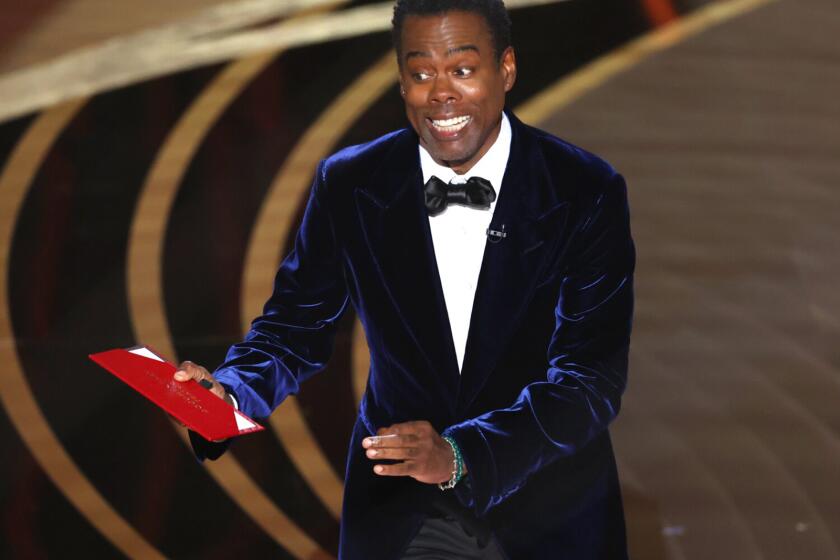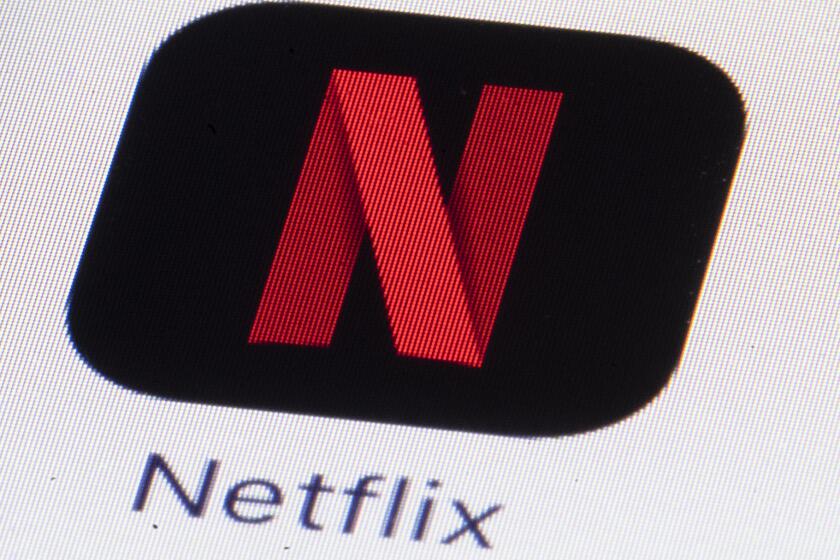‘Love Is Blind’ snafu. Streaming with ads. Questions for Netflix ahead of earnings

- Share via
Over the last year, Netflix has taken steps to boost profits and entice more subscribers to stay on its streaming service.
Those efforts have included launching a cheaper ad-supported plan, pushing nonpaying Netflix viewers to subscribe and streaming live events.
Its trials haven’t all gone smoothly. Sunday night, for example, marked a major stumble in live programming.
Netflix said Tuesday that would end its DVD mailing service in September, marking the end of an era for the streamer as it evolves to compete with rivals.
Netflix had planned to stream a live reunion show for reality dating series “Love Is Blind,” but after experiencing significant delays, the company ended up recording the reunion and many viewers couldn’t watch it until the taped version was added to Netflix’s platform the next day.
“To everyone who stayed up late, woke up early, gave up their Sunday afternoon… we are incredibly sorry that the Love is Blind Live Reunion did not turn out as we had planned,” Netflix tweeted on Sunday night.
The snafu is an example of the challenges Netflix faces as it changes its business model from its original position as an on-demand subscription video streaming service with no ads.
Netflix disrupted Hollywood and became the envy of the entertainment industry during streaming’s growth spurt, but the Los Gatos giant has recently faced increased competition from Disney+, Peacock, Apple TV+ and Amazon Prime Video, as well from video apps like TikTok that are continuing to eat into the amount of time consumers spend on entertainment.
Netflix has been adding subscribers after suffering declines in the first half of last year. Netflix’s woes spurred a course correction among streamers as they faced more pressure from investors to grow profitability, resulting in layoffs and show cancellations. To attract more subscribers, Netflix has diversified its library with mobile games and live events.
On Tuesday, Netflix will release its first quarter earnings report, which analysts expect will provide insight into the company’s profitability, its advertising efforts and possibly more information on Netflix’s plans to monetize password sharing.
Analysts anticipate Netflix’s overall revenue will increase 4% to nearly $8.2 billion in the first quarter compared to a year ago, according to FactSet. They estimate that Netflix increased paid subscribers by 2.36 million in the first quarter, FactSet said.
Here are three questions we have going into Netflix’s earnings.
Millions of viewers tuned in to Netflix on Sunday night, ready to watch the ‘Love Is Blind’ live Season 4 reunion, only to find that it was delayed and then scrapped for a taped special instead.
Will executives address the ‘Love Is Blind’ delay?
More streamers, including Amazon and Apple TV+, have leaned into live events as a way of creating appointment-style TV viewing that draws large audiences.
Amazon pays $1 billion annually to stream 15 Thursday-night NFL football games, while Apple TV+ has agreements with Major League Baseball and Major League Soccer to carry games. Disney+ aired a live Elton John concert from Dodger Stadium last year.
The “Love Is Blind” reunion marked Netflix’s second foray into live programming, to be followed by March’s highly anticipated Chris Rock comedy special. The company plans to live stream the SAG Awards on its platform next year.
It is unclear what caused the delay on Sunday’s “Love Is Blind” live reunion. Nonetheless, it was a setback.
“It’s a black eye for Netflix — a poorly timed outage given this is essentially the second live event it has hosted,” said Paul Verna, a principal analyst and head of advertising and media practice at research firm Insider Intelligence.
It is common for streamers to have problems during live events, and analysts say Netflix can overcome its challenges in live TV.
Comedian Chris Rock will be the first artist to perform a live special on Netflix, which some analysts say could help create more appointment-based TV on streaming.
“As Netflix learns the basics of live broadcast, it appears that consumers will need to go along with the ride,” said Jon Christian, executive vice president, digital supply chain of media and entertainment consulting company Qvest U.S. “The level of interest in the live show is a positive indicator of what’s possible for advertising and subscribers.”
How is Netflix’s advertising business faring?
Netflix in November launched its cheaper, ad supported plan, which sells in the U.S. for $6.99 a month. The company launched the plan amid increasing competition from rivals — such as Paramount+ and Peacock — that already offered cheaper versions of their streaming services with ads.
Tuesday’s earnings results will include the first full quarter of Netflix’s ad-supported plan. Some analysts believe Netflix‘s version with ads may help reduce the amount of cancellations, as subscribers now can choose to downgrade to a cheaper plan.
“We think Netflix is well-positioned in this murky environment as streamers are shifting strategy, and should be valued as an immensely profitable, slow-growth company,” wrote Wedbush Securities analysts Alicia Reese and Michael Pachter in a research note.
Insider Intelligence estimates Netflix will generate $770 million in ad revenue from the plan by the end of the year. That number is expected to grow nearly 39% to $1.07 billion by 2024.
The plan, which starts Nov. 3, would bring 4 to 5 minutes of commercials per hour to Netflix programs like “Emily in Paris.”
Any updates on password sharing?
Netflix is trying to push freeloading Netflix users to buy subscriptions. Alternatively, the company wants subscribers to cover password-borrowing users who do not live in their households. Netflix has rolled out its password monetization plans in Canada, New Zealand, Peru and other countries. But it has yet to come to the U.S., and Netflix hasn’t specified when it will.
Password piracy and account sharing is expected to cost streamers and pay TV providers $12.5 billion in 2024, according to Parks Associates.
Netflix’s co-Chief Executive Greg Peters noted in an earnings presentation in January that “this will not be a universally popular move.”
“We’ll see a bit of a cancel reaction to that,” Peters said in January, but argued that Netflix will benefit long-term.
A survey from New Street Research suggests that some password sharers would be willing to pay up. Fifty-four percent of nonpaying Netflix users were willing to pay for their own membership if their access was canceled, and 37% of subscribers said they would pay more for Netflix users that are not part of their household, according to New Street Research’s survey, which polled 942 U.S. Netflix users.
More to Read
Inside the business of entertainment
The Wide Shot brings you news, analysis and insights on everything from streaming wars to production — and what it all means for the future.
You may occasionally receive promotional content from the Los Angeles Times.
















